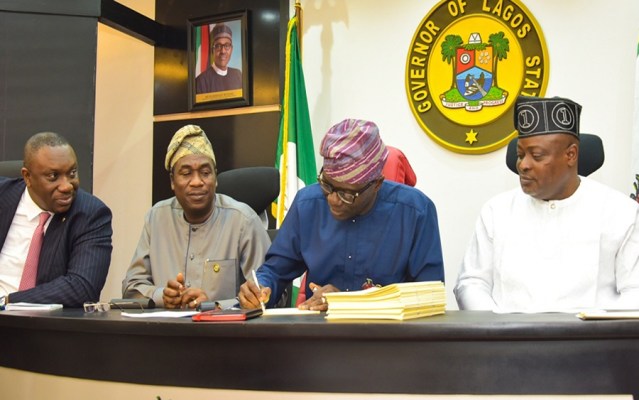Lagos state government has cut its 2020 budget by 21% as a result of the economic downturns occasioned by the COVID-19.

This was made public on Thursday by the state Commissioner for Economic Planning and Budget, Sam Egube.
The review which was approved by the State Executive Council aimed to reduce the N1.168 trillion budget approved by the Lagos State House of Assembly to N920.5 billion.
Egube said the initial budget figure contained a capital expenditure of N711 billion and N457 billion recurrent budget indicating a clear preference for capital projects of 60 per cent ratio.
He announced that a budgetary result of 56 per cent (N163.28 billion) was recorded in the first quarter of 2020, which was in absolute terms higher than the 68 per cent (N148.38 billion) recorded in 2019 for the same period.
The commissioner pointed to the negative effect of dropping crude oil prices on statutory allocation projections, downward pressure on Internally Generated Revenue (IGR), devaluation of the naira, decreased public and private investment and rising inflation levels as reasons for overhauling the estimated 2020 budget estimates.
He identified other factors to include the decrease in demand for goods and services, as well as a decrease in manufacturing activities which he said suggested lower growth in GDP and increased unemployment.
Egube clarified that Lagos has adopted a holistic approach to COVID-19-induced shocks, adding that the approaches included retaining a strong pandemic response, restarting the economy, and re-imagining how the state worked.
According to him, in addition to economic stimulus, the strong pandemic response would allow the state government to generate mechanisms for food security and safety net.
“To restart the economy, we are going to optimise the state’s budget for investments in jobs and priority sectors through job creation, economic stabilisation, and fiscal consolidation,” Egube said.
He added, “In reimagining the state economy, we will prepare the state to operate and thrive within the new reality with digitisation, business environment reforms, improved economy and diversification of revenue sources.”
The commissioner disclosed that the revised budget has a reduction of the total budget size by 21 per cent from N1,168.562 billion to N920.469 billion, with the financing deficit increasing slightly by 11 per cent from N97.533 billion to N108.005 billion.
The recurrent expenditure (debt and non-debt) in the revised budget, according to him, will decline by 10 per cent from N457.529 billion to N411.608 billion and 28 per cent reduction has been proposed for total capital expenditure from N711.033 billion to N508.861 billion.
“The revised total revenue represents a drop of 24 per cent in the previous projections from N1,107.029 billion to N812.46 billion,” Egube said.

